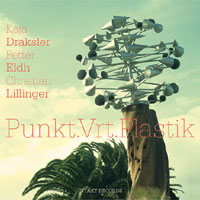Kaja Draksler, Petter Eldh, Christian Lillinger • Punkt.Vrt.Plastik
 unkt.Vrt.Plastik
brings a fresh perspective to the hardy piano trio -- an alternative to Bad Plus wannabes.
The trio behind it was formed after its members improvised a set together at the
bridge-building October Meeting 2016. That emerging-musicians meet-up was in Amsterdam,
where Slovenian pianist Kaja Draksler is among the brightest younger bulbs on that
city’s enduring improvised-music scene. Drum wiz Christian Lillinger and Swedish
bassist Petter Eldh work out of Berlin, where they’d already teamed up in several
combinations, honing a very particular brand of hiccuppy rhythm involving subdivided beats
and quick shifts between or among meters. An already complex repeater riff might get
bumped out of shape by a 16th note or so, giving everything a slightly glitchy quality
that doesn’t slow momentum. unkt.Vrt.Plastik
brings a fresh perspective to the hardy piano trio -- an alternative to Bad Plus wannabes.
The trio behind it was formed after its members improvised a set together at the
bridge-building October Meeting 2016. That emerging-musicians meet-up was in Amsterdam,
where Slovenian pianist Kaja Draksler is among the brightest younger bulbs on that
city’s enduring improvised-music scene. Drum wiz Christian Lillinger and Swedish
bassist Petter Eldh work out of Berlin, where they’d already teamed up in several
combinations, honing a very particular brand of hiccuppy rhythm involving subdivided beats
and quick shifts between or among meters. An already complex repeater riff might get
bumped out of shape by a 16th note or so, giving everything a slightly glitchy quality
that doesn’t slow momentum.
The trio’s linchpin is Lillinger, who wrote five of nine compositions, setting the jittery agenda. The first half of "Plastik" showcases his signature drumming: fast, clean clatter less connected to Buddy Rich than 1990s drum ’n’ bass superbeats. Bassist Eldh, who has his own percussive thunder, is right there with him. They stumble headlong in perfect sync, a dance of tiny hesitations and course corrections in which they make sound conversational, almost offhand. Lillinger’s melody "Azan" and Eldh’s "Punkt Torso" play related games with time: a short melodic figure seems to slide out of tempo, requiring parallel lurches from bass and drums. There’s nothing here you’d call swinging, exactly, though "Veins" has a buoyancy and sense of rhythmic surprise that honor jazz values by other means. The recording’s boomy low end makes a connection to dancehall beats. There are no blatant hip-hop homages. But mutating spirals of melody and the micro-rhythmic complications reflect hip-hop’s mutable circular forms, and various techno schools that grew up alongside. Transferring those head-scratcher patterns to acoustic/jazz instruments isn’t a totally new idea; acts like Digable Planets pointed the way in the '90s, and jazz drummers were quoting early hip-hop beats before that. Meanwhile, pianist Draksler casts herself as the rhythm tandem’s foil. With all that density below, she goes the other way, mining the piano’s ability to convey a sense of space even in a dense context. Her relative reticence opens the busy pieces out. She can bring ample power to the keyboard, as when ripping out rapid runs on Lillinger’s broken trot "Nuremburg Amok." But much of what she plays on Punkt.Vrt.Plastik she could negotiate with one finger on each hand. Lillinger’s meandering circular themes carry a whiff of old-school serialism. (He’s into Stockhausen.) Those written lines may embed repetitions and warped paraphrases that give individual pieces a distinct shape, and Draksler plays them drily, without emotional commentary -- she respects the material’s cool air. In a similar way, the equilateral sound balance honors her choices: piano isn’t mixed out front. The instruments sound close-miked, naked, appropriately unsentimentalized. Still, on Eldh’s closing "Life Is
Transient," the closest thing to a ballad, romantic piano is decidedly in the lead,
Lillinger rustles his brushes and Eldh plays the chord changes, even if the frisky rhythm
never settles down. Draksler, who never overplays, does give herself room to stretch on
her lone composition, "Evicted," the longest performance at eight minutes,
double the norm. During a solo interlude, one hand clacks the high keys while the other
rumbles way low: wayward lines in contrasting rhythms. That’s how these players roll. |
